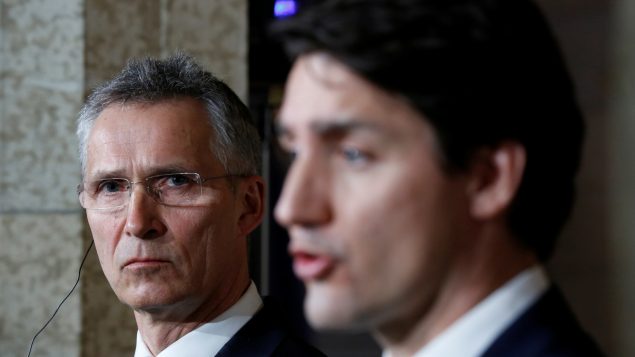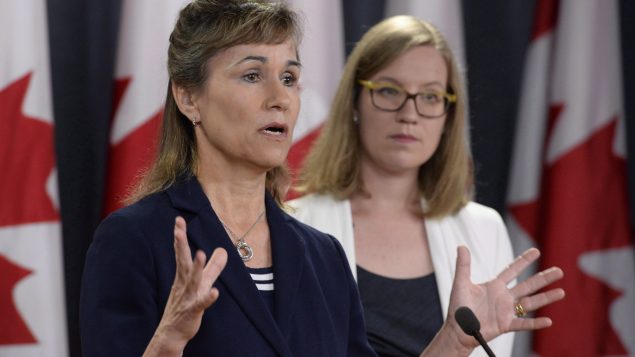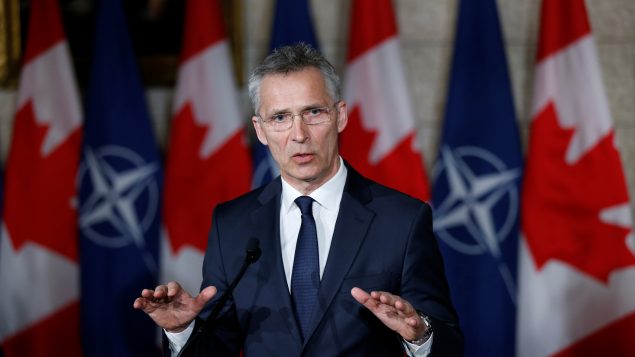NATO could trigger its collective defence mechanism if faced with a devastating cyberattack, the alliance’s Secretary General Jens Stoltenberg said Wednesday.
“NATO takes cyberthreats very seriously because we have seen more and more cyberattacks,” Stoltenberg told reporters in Ottawa during a joint press conference with Prime Minister Justin Trudeau.
“Cyberattacks can be as damaging as kinetic attacks.”
That’s the reason that back in 2014 the alliance agreed that a cyberattack could trigger NATO’s Article 5 and a response from the entire alliance, said Stoltenberg, who was in Ottawa for a two-day visit to discuss a host of issues with Canadian officials ahead of the upcoming NATO leaders summit in Brussels.
Collective cyberdefence

NATO Secretary General Jens Stoltenberg listens to Canada’s Prime Minister Justin Trudeau speak during a news conference on Parliament Hill in Ottawa, Ontario, Canada, April 4, 2018. (Chris Wattie/REUTERS)
NATO’s Article 5, which enshrines the principal that an attack on one member constitutes an attack on all, has been triggered only once in the alliance’s 69-year existence after the 9/11 terror attacks on the United States.
“Our response will always be measured, defensive and proportionate, therefore we will assess the attack and then decide how to respond,” Stoltenberg said.
“And it’s not always obvious that given a cyberattack we will respond in cyberspace, there are other ways to respond to cyberattacks.”
NATO is working hard to beef up its cyberdefences and help alliance members to protect their cyberspace, he said.
“We help countries with technology, with exercises, we have a centre of excellence where we share best practices and we have a team of 200 cyberexperts, who are ready to be deployed in different NATO allied countries if needed to help them defend their cybernetworks,” Stoltenberg said.
Canada beefs up its cyberdefences

Democratic Institutions Minister Karina Gould and the Chief of the Communications Security Establishment Greta Bossenmaier hold a news conference to discuss an assessment of cyber threats to Canada’s democratic process in Ottawa, Friday June 16, 2017. (Adrian Wyld/THE CANADIAN PRESS)
Canada too has invested significantly in upgrading its cybercapacity, Trudeau said.
“We know that cyberattacks are a new realm of interference and pressure by various states on other states,” said Trudeau. “It is something that we had multiple discussions at the multilateral level, particularly around the NATO alliance, it will continue to be an area of concern as more and more of our citizens engage in ways that are linked to computer systems, whether it’s our banks, our power grids or a broad range of issues.”
- Electronic spy agency warns of growing cyber threat to Canada’s democratic process
- Canada regularly under state-sponsored cyber attacks
Trudeau said the expulsion of over 120 Russian diplomats from various Western countries, including four from Canada, points to another way of dealing with such attacks.
“This is an example of the kind of response that NATO allies and others will have to incursions into areas of sovereignty,” Trudeau said.
No new arms race
At the same time, NATO doesn’t want a new Cold War or a new arms race, Stoltenberg said.
“We’re focused on how we can respond in a firm, strong, predictable, but also measured and defensive way,” Stoltenberg said.
“Russia is there to stay, Russia is our neighbour so we will continue to strive for a more constructive relationship with Russia.”







For reasons beyond our control, and for an undetermined period of time, our comment section is now closed. However, our social networks remain open to your contributions.